iPhone 5th Birthday: How the iPhone Changed the World [VIDEO]
Turning five years old today, the iPhone has been a huge success for Apple, but the world's first true smartphone has changed the world on a much wider scale.
Five years is not a long time in the grand scheme of things, but in the context of smartphones it seems like an eternity.
Five and a half years ago, Steve Jobs took to the stage at MacWorld and unveiled to the world the iPhone.
It was a mobile phone, but like nothing the world had ever seen before. It was revolutionary and would change the way people interacted with the world forever.
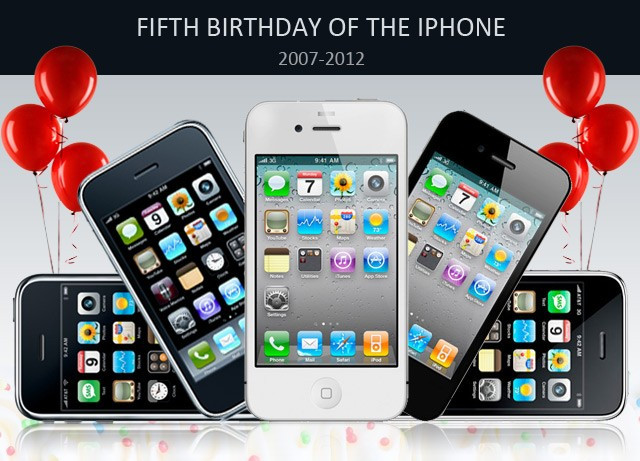
At the time people were used to using phones with small screens paired with physical keyboards which took an age to connect to the internet.
Even though there wouldn't be an App Store until the iPhone 3G, the original iPhone came bundled with a range of apps, something which had never been seen before.
These included Google Maps, YouTube, Stocks, Weather and Camera, most of which are still seen on iPhones today.
However some people were not so impressed, and Microsoft's Steve Ballmer memorably laughed when asked at the time about the iPhone.
Revolutionary and Magical
During the keynote presentation at the Moscone Center in San Francisco, Steve Jobs said "iPhone is a revolutionary and magical product that is literally five years ahead of any other mobile phone," and five years down the line, it is hard to argue with him.
The iPhone is Apple's biggest selling product by some margin, and according to data just released by Strategy Analytics, Apple has sold 250 million iPhones generating $150bn in revenue in the process.
But, consider the fact that 100m of those 250m sales have taken place in the last year alone, and it is clear that the iPhone is still growing - and at an unprecedented rate.
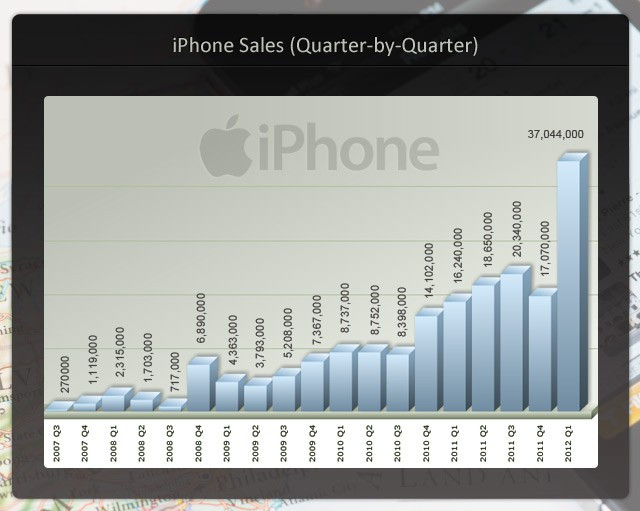
On 29 June, 2007 people queued up overnight and around the block outside AT& T stores in the US to get their hands on the first iPhone - a practice which is still alive and well with the release of Apple products five years later.
But the iPhone has not just affected Apple, it has changed the whole mobile phone world, by creating the template, which others followed.
Google announced this week that one million new Android phones and tablets are being activated every single day.
As Charles Arthur points out in the Guardian, in a few years' time we won't have a choice about buying a smartphone or not, they will be ubiquitous: "Analysts' predict that in two years, 90 percent of mobile users will have no choice but to own smartphones - even if all they want to do is call and text."
Here we have outlined five ways in which the iPhone has changed the world, and how it will continue to do so:
1. The iPhone created the smartphone revolution
Before the iPhone launched, people were stuck using small screens paired with keyboards. Users were constantly frustrated by the drudgery of navigating the internet on these devices.
Phones pre-iPhone were essentially for texting, making phone calls and, if you really had to, browsing the internet and sending emails.
The iPhone changed everything. By introducing the idea of the app and an all-screen multitouch interface, it changed the future of smartphones forever.
Manufacturers like Samsung, Sony and HTC quickly followed suit, though other smartphone manufacturers like Nokia and BlackBerry were reticent to embrace the new smartphone world and the folly of that decision is now resulting in both companies struggling to survive.
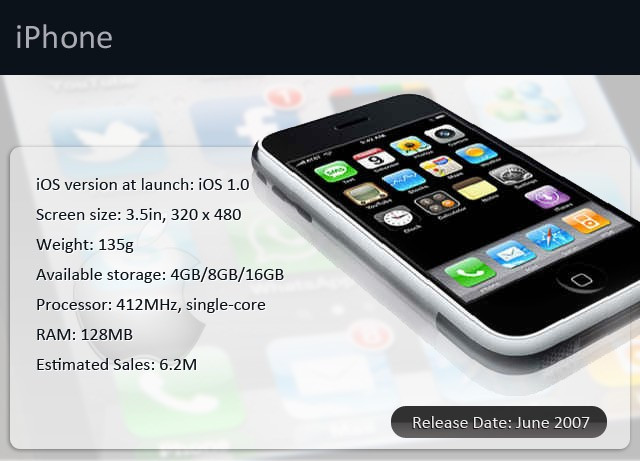
The introduction of the App Store in the second generation iPhone 3G changes things again, and created a platform for third party developers to reach their target customers.
All it required was an iTunes account and credit card and all you needed to do to install a new app on your phone was to press Install. Simple.
Google quickly followed suit with the Android Market (now Google Play) and Microsoft has the Windows Marketplace.
Apple created a device that was part iPod, part phone, part portable games console, part internet portal and combined it in a beautifully designed unit which was easy to use. And, despite five years of trying, no other manufacturer has quite managed to match this combination.
2. The iPhone works
One of the greatest tricks Apple pulled off with the iPhone was making it accessible. Everyone from your grandmother to a five-year-old child could use it.
It was intuitive and didn't require any technical knowledge. Pressing an app icon did what you expected it to do. Swiping from left to right did what you expected it to do.
Apple created a closed eco-system which meant that only software designed for the iPhone and cleared by Apple would be available in the App Store.

While some complained of this walled garden approach, the fact remains that it resulted in software working properly with the device and rarely crashing.
Apple takes a 30 percent cut of any sales from the App Store and iTunes but developers and recording artists/studios seem happy to give that up in return for a captive audience of users who are willing to pay for content.
Another feature of the iPhone, which Android devices in particular struggle to come close to, is in relation to software updates.
Because Apple releases just one version of the iPhone every year, there is no issue over hardware fragmentation and so when a new version of iOS comes out, Apple is able to push this out to all compatible iPhones at the same time.
In comparison, Android users are let in limbo for up to a year before getting the 'latest' version of Google operating system.
3. The iPhone is secure
And it is this walled garden approach with has helped Apple prevent the appearance of mobile malware in the App Store.

Apple checks every app which is submitted to the App Store and while this can cause problems for developers who are made to wait before their apps are available to buy, it means users don't have to worry about security.
F-Secure's security chief, Mikko Hypponen, tweeted yesterday: " iPhone is 5 years old today. After 5 years, not a single serious malware case. It's not just luck; we need to congratulate Apple on this."
However it would be folly to believe the platform is infallible and proof-of-concept malware has been shown to breach Apple's security, but for now, compared to Google Play, it is secure.
However, as Hypponen's colleague Sean Sullivan pointed out, there are apps available, such as FlexiSpy, which may not be classed as malware by Apple, but can still be used to read messages, emails, IMs and contact details from someone else's phone.
Sullivan went on to point out that Apple doesn't allow antivirus companies access to the App Store, adding: "I'll withhold my congrats."
There is some malware out there which targets iPhones, but only if they have been jailbroken.
4. The iPhone has created jobs
In the five years since the iPhone launched, Apple has created 35,852 retail jobs, according to data from Asymco. While this is obviously down in part to the opening of new stores but the average number of employees per store has jumped from 37 in Q1 2007 to a staggering 117 in Q1 2012.
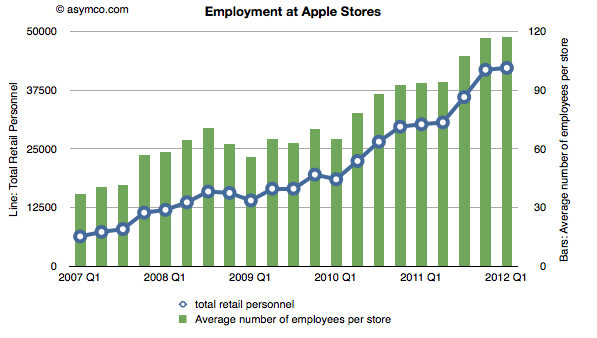
While Asymco point out a range of reasons for this jump, including store layout changes, longer opening hours and bigger stores, the popularity of the iPhone and in turn the iPad has also had a huge effect on the number of people working in store for Apple.
Along with the retail staff, Apple has created work for a huge number of workers in China where the iPhone is manufactured, mostly by Foxconn. Though there have been a lot of questions raised about the conditions in these plants - with current CEO Tim Cook travelling to China to appease concerns earlier this year.
However it could be another group who has benefited the most - software developers. Prior to the launch of the iPhone and subsequent smartphone platforms, writing software for phones was a fairly limited business model.
The app revolution has created thousands of new companies who just create iOS apps, and Apple has so far paid out over $5bn to app developers since the iPhone launched in 2007, thanks to some 30bn downloads from the app Store in that time.
The final group to have benefitted from Apple's creation is accessories manufacturers with everything from cases to camera lenses now available to personalise your iPhone.
5. iPhone has software to support it
As we said, app developers have profited from the success of the iPhone and the breath of apps available on the platform has been one of the main reasons for the success of Apple's phone.
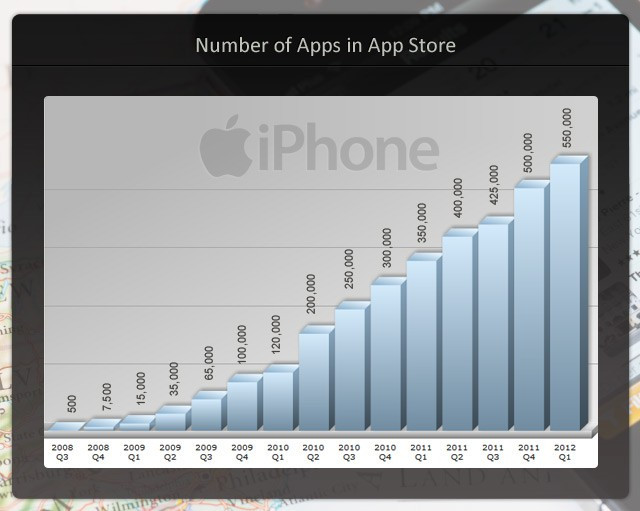
The phrase "There's an app for that" is now part of everyday language and with 650,000 apps available in the App Store, it would seem to be true.
The 650,000 figure is split between games and apps with Apple reporting earlier this month that 30 billion apps have been downloaded in the past five years.
As you can see from our all-time top ten iPhone apps list, casual gaming is what most people want to do with their iPhone. Angry Birds and Cut the Rope are among the most popular games ever thanks to the popularity of the iPhone.
Indeed so successful has Angry Birds been on the iPhone (and Android) that it has spawned its own fluffy toys, sweets and even a theme park with a movie reportedly in the works.
Happy Birthday iPhone
So we wish the iPhone a happy birthday and despite Steve Jobs no longer being at the helm in Cupertino we can only see it going from streength-to-strength in the coming years and with the iPhone 5 set to launch later this year, everyone else could still be playing catch up with the iconic phone by the time it turns 10.
Must Read:
iPhone 5th Birthday: History of the iPhone
© Copyright IBTimes 2025. All rights reserved.






















